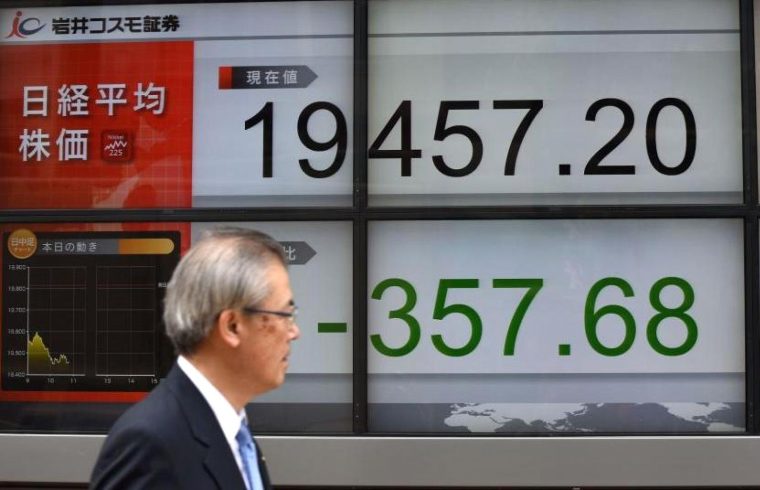
Stocks in Asia closed the session mixed after cautious trade on Wednesday as the British pound fell on new poll results ahead of the U.K. election and on better than expected official PMI figures out of China.
Ahead of an election next week, U.K. Prime Minister Theresa May’s Conservative Party could lose 20 of the seats it currently holds while the Labour Party could gain 30 additional seats, according to the poll by YouGov. This would result in a loss of the Tories’ overall majority at parliament, The Times newspaper reported.
The British pound slipped to as low as $ 1.2788, close to a one-month low reached last Friday, following the news compared to a high of $ 1.2867 in the overnight session. The pound recovered slightly to trade at $ 1.2806 at 2:50 p.m. HK/SIN.
In Asia, the Nikkei 225 edged down by 0.14 percent or 27.28 points to close at 19,650.57 while the Kospi reversed earlier losses to finish 0.16 percent or 3.7 points higher at 2,347.38.
The S&P/ASX 200 ended the session 0.12 percent or 6.714 points higher at 5,724.6.
Chinese markets were mixed after the long weekend. The Hang Seng Index traded flat at 3:00 p.m. HK/SIN. Meanwhile, the Shanghai Composite edged higher by 0.24 percent or 7.4218 points to close at 3,117.4805 and the Shenzhen Composite dipped 0.1 percent or 1.8089 points to close at 1,808.3019.
This was just after the release of official Purchasing Managers’ Index (PMI) for the month of May, which came in at 51.2 compared to the 51.0 estimated.
The Australian dollar, which tends to be sensitive to resource demand from China, trended higher after the news to trade around $ 0.7474. The Aussie later declined to trade at $ 0.7449 against the dollar at 2:52 p.m. HK/SIN.
“It’s a tiny … beat, but to be honest, not too much to be read into these numbers. It’s business as usual. I think at the moment, the market is perhaps taking a slightly … less serious view of the Chinese output numbers,” Bank of Singapore CIO Johan Jooste told CNBC.
Political developments at the end of the year and China’s attempt to contain leverage are bigger market drivers than PMIs at the moment, Jooste added.
Meanwhile, the overnight yuan borrowing rate in Hong Kong rose to its highest level in five months, Reuters said.
Japan industrial production for April rose 4 percent from last month, compared to the 4.3 percent estimated by a Reuters poll. The yen was slightly stronger, with the greenback fetching as little as 110.78 yen after the news compared to around 110.84 earlier. Dollar/yen traded at 110.97 at 2:55 p.m. HK/SIN.
South Korea’s LG Display reversed losses in early trade to gain 1.72 percent. Shares of the LG Display had jumped in the last session on news the company was “reviewing” an increase in its investments in flexible organic light-emitting diode (OLED) screen production, the Financial Times reported.
Shares of Mitsubishi Motor were higher by 0.84 percent to close at 718 yen a stock. In a note, Citi said it was upgrading its call on Mitsubishi Motor shares to “Neutral,” following Nissan outlining its medium-term plans. Nissan has a controlling stake in Mitsubishi.
Citi analysts Arifumi Yoshida, Yingqiu Zhang and Manabu Hagiwara said there was an increased possibility of a “specific roadmap for long-term synergies with Mitsubishi Motor being delineated.”
The dollar index traded at 97.439 at 2:52 p.m. HK/SIN.
“The dollar index remains under pressure despite drifting to a seven-night high overnight. The shallow retracement can be partly explained by lower liquidity due to (the) three-day weekend in the U.S. and weakness in the euro, neither of which are compelling reasons to buy the dollar,” ThinkMarkets Senior Market Analyst Matt Simpson said in a Wednesday morning note.
Brent crude futures tumbled 0.93 percent to trade at $ 51.37 a barrel while U.S. crude fell 1.07 percent at $ 49.13. Prices of Brent crude had fallen almost 1 percent in the overnight session on worries about an oversupply in the oil markets.
After the long weekend, Wall Street closed lower on the release of key economic data stateside.



